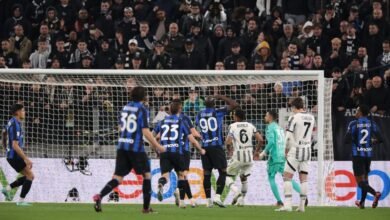How Wagatha Christie trial went from High Court to West End

[ad_1]
Argentina and France could have simply performed probably the most thrilling World Cup last in residing reminiscence, however earlier this 12 months one other football-adjacent conflict had individuals gripped for very totally different causes: Coleen Rooney (spouse of former England and Manchester United nice Wayne) and Rebekah Vardy (whose husband, Jamie, is the striker who spearheaded Leicester City’s miraculous 2015-16 Premier League title triumph) contested a bitter High Court libel battle in what was dubbed “The Wagatha Christie Trial.”
– Stream on ESPN+: LaLiga, Bundesliga, extra (U.S.)
Now, that authorized tussle has moved from the Royal Courts of Justice to London’s West End stage, bringing the trial to life and analysing the hysterical response when the themes of the front and back pages of the tabloids conflict in such spectacular style. “Vardy v Rooney: The Wagatha Christie Trial,” written by Liv Hennessy and directed by Lisa Spirling and starring Laura Dos Santos and Lucy May Barker because the respective titular characters, is taking part in at Wyndham’s Theatre till Jan. 10 earlier than a second run on the Ambassadors Theatre begins in April.
There are often theatrical productions that deal ultimately with soccer — with William Gaminara’s “The Three Lions” (2013,) Patrick Marber’s “The Red Lion” (2015) and 2022’s “Gods of the Game: a Football Opera” at Grange Park being notable examples of latest years. But “Vardy v Rooney” is totally different as a result of it examines the general public’s fascination with “WAGs” (the acronym which means “wives and girlfriends” that was first extensively utilized to the companions of England footballers in the course of the 2006 World Cup) and the celebrity which defines their lives.
At 10:29 a.m. on Oct. 9, 2019, Coleen Rooney posted an Instagram and accompanying Twitter submit, revealing her beginner sleuth work in uncovering the alleged miscreant who had been leaking private details about Rooney and her household to The Sun newspaper. Rooney had arrange her personal investigation, during which she posted pretend tales on her Instagram account that have been seen to solely one in every of her followers, and waited to see whether or not these tales appeared within the tabloids. When she had completed her probe, Rooney introduced to the world that the topic of the sting operation had been “………. Rebekah Vardy’s account.“
This has been a burden in my life for a number of years now and at last I’ve obtained to the underside of it…… pic.twitter.com/0YqJAoXuK1
— Coleen Rooney (@ColeenRoo) October 9, 2019
The tweet proved to be mightier than the sword; the web went wild. Twitter was awash with content. Meme after meme appeared, spreading through the hashtag “#wagathachristie” (regardless of the very first tweet making the pun containing a typo.) Of course, as with the whole lot on social media, for each meme partaking in some goodhearted banter there was a heinous remark on the expense of the then-pregnant Vardy.
On June 23, 2020, eight months after Rooney’s explosive submit, Vardy sued Rooney for £1 million in a High Court libel go well with. Between November 2020 and May 2021, the pair have been out and in of courtroom in London, hashing out the preliminary phases of the libel motion. Attempts at out-of-court mediation had damaged down, which meant the case was barrelling in direction of probably the most high-profile — and costliest — movie star trial in British historical past.
Like all good whodunnits, we obtained our last showdown within the courtroom; on May 10, 2022, Vardy and Rooney got here face to face in courtroom as their libel trial kicked off on the Royal Courts of Justice on The Strand in London earlier than Mrs. Justice Steyn. And, spoiler alert, it was completely wild. On the primary day alone Vardy was saved from the witness stand till 4 p.m. whereas the courtroom clarified the specifics of how Instagram features. When she did arrive on the stand, she was instantly questioned on a earlier tabloid article during which she had described a sure a part of pop singer Peter Andre’s anatomy as like “a miniature chipolata.”
Things then took an much more farcical flip when the courtroom heard how Vardy’s agent, Caroline Watt — who was not known as as a witness within the trial after the courtroom was advised she was in a “fragile state” and never match to take the stand — had misplaced a cell phone with probably essential proof when it, as Rooney’s barrister advised the courtroom, “accidentally slipped out of her hand overboard on a boat in the North Sea.”
The trial was a postmodern mishmash of excessive and low tradition, with High Court judges taking a crash course within the trivialities of Instagram’s logistics and etiquette, whereas bewigged and plummy-accented barristers questioned Vardy on the appendages of C-list celebrities.
What unfolded over the course of the seven-day trial would find yourself being good fodder for the upper-class world of London’s West End theatre. And after Vardy misplaced the case and was ordered to pay up to £1.5 million of Rooney’s authorized prices when Judge Steyn dominated that Rooney had proved her allegation was “substantially true,” that is precisely what occurred.
“Vardy v Rooney: The Wagatha Christie Trial” is a verbatim piece: all of the dialogue is direct quotes from the transcript of the authorized trial, which may be very totally different from the standard theatrical expertise.
The pre-performance air bristled with anticipation because the viewers entered the theatre to hear atmospheric audio of soccer followers chanting and jeering. On stage, the set contains a minimalist illustration of a courtroom and the boards are coated with astroturf, full with the markings of a soccer pitch.
The motion of the trial is held collectively by two commentators, performed by Nathan McMullen and Sharan Phull, who breathlessly information us by way of the motion, with numerous in-jokes and metaphors for the soccer-literate. They inform us we’ll be getting 90 minutes of end-to-end motion — though, like most of the matches with a great deal of further stoppage time on the 2022 World Cup, the play is a bit longer than that. It’s a surreal expertise for a soccer fan to hear Riyad Mahrez and Danny Drinkwater namechecked on a West End stage.
There appeared a snobbish impulse from the viewers to snicker at Rooney’s Liverpool accent, composedly carried out by the sensible Dos Santos, or when the very good Barker’s Vardy does not perceive a reference to Davey Jones’ locker [in a reference to the whereabouts of her agent’s phone]. But the power of the play is that it makes the viewers problem their preconceptions, as director Spirling supposed.
“I was adamant that I was not interested in punching down on these women,” Spirling advised ESPN. “They … live in extraordinary circumstances. Among the things that me and [writer] Liv were really impressed about was their ability to hold their own on a witness stand. Coleen especially just blows them out the water, and you realise how intelligent and diligent they are.”
What many soccer followers have in frequent with the broader public is an obsession with “WAG” tradition. Salacious gossip has all the time been like kryptonite to tabloid-reading Brits and this case feels uniquely linked to that tradition. It seems like two ladies screaming at one another in a bar with the remainder of the patrons wanting on; individuals would possibly say “that’s terrible, they should stop fighting” however they are going to all nonetheless seize the popcorn and revel within the scene. Spirling believes it is as a result of we take consolation in “watching something we know on stage.”
And you possibly can see that “Vardy v Rooney” matches right into a lineage of British performs that, as Spirling places it, “are in conversation with our times.” It’s a convention that goes proper again to William Shakespeare; reflecting on the problems of the day and inspiring the viewers to have interaction in an nearly pantomime method — there would have been jeers and boos on the thinly veiled references to James I as “Macbeth” was staged for the primary time. “Vardy v Rooney” is an addition to the lengthy historical past of theatre reflecting our world again at us, in addition to feeding the innate human need for gossip.
But, on this case, the general public ought to do not forget that they’ve an obligation of care to these ladies. Yes, it may be argued that they introduced it on themselves, or that it’s the value of fame and wealth, but it surely additionally appears that Vardy and Rooney have discovered to take again some management over a media that continually tries to rip it away from them. Spirling asks this query herself: “Why do people who claim to want privacy have such a crazy social media life? I guess it’s about controlling your own narrative. To take something away from the media and tabloids that’s ruined their lives. That feels very human.”
England supervisor Gareth Southgate touched on this along with his assertion earlier this 12 months that “WAGs” is a “disrespectful term.” During the trial, Rooney urged the courtroom not to use the time period a number of instances, suggesting that the endurance of influential figures inside the sport is operating skinny on this gratuitous obsession.
So what’s subsequent for the story of the Wagatha Christie story? Rooney has signed up for a documentary in regards to the trial for Disney+, whereas the BBC has commissioned a rival present and Channel 4 final week broadcast a two-part dramatisation, “Vardy v Rooney: A Courtroom Drama,” that includes Natalia Tena (aka Nymphadora Tonks from the Harry Potter films) as Vardy, “This Is England” star Chanel Cresswell as Rooney and Michael Sheen as Rooney’s barrister, David Sherborne.
Like the case it’s based mostly on, the play may be very a lot a product of its time, and Spirling believes that we’re unlikely to see something of its form once more sooner or later.
“This trial will probably never happen again because we’re in a moment which is the Wild West of social media,” she mentioned. “It couldn’t have happened 10 years ago, because we didn’t have Instagram and Twitter the way we do now, and in 10 years’ time the legislation will be in place that … if you make a comment on social media you can be sued for it.”
[ad_2]
Source link





